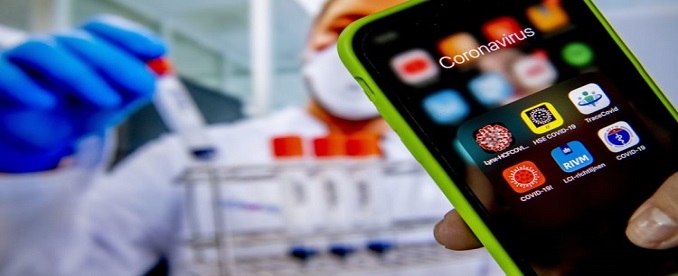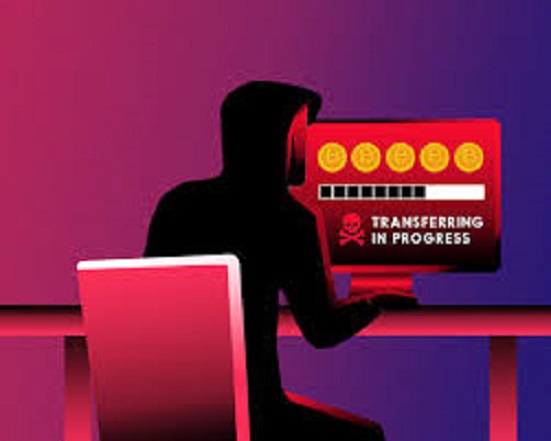Telecom
History as Nigerian Firm Develops Rapid Trace to Tackle COVID-19

Rapid Trace, an innovative mobile app, key to the fight against coronavirus (COVID-19) has been developed by Cadnetwork Enterprise, a fledgling Nigerian firm.

The app designed for Nigeria by Nigerians is free to download on www.rapidtrace.com.ng but currently available only on Android.
The mobile app features include: contact tracing; social distance enforcement; crowd control; self testing & QR; among others.
Darlington Onyeagoro, strategy consultant, Rapid Trace, said the mobile app was launched because technology is a common denominator in managing, mitigating the impact of the pandemic, restoring livelihoods and tackling similar challenges in the future.
According to Onyeagoro “contact Tracing — presently our nation has employed a manual means of contact tracing by asking about travel history but with the Rapid trace app, contact tracing will be enhanced with the use of GPS and Bluetooth technology. The app automatically pairs via Bluetooth with another that is in close proximity to it, e.g closer than 2m with respect to time (15 minutes). This makes contact tracing easy as people that were in close proximity with a sick person in the last 14 days are notified to quarantine themselves and go for testing”
“Enforcing social distancing this superb feature is enabled by the use of in-app proximity sensor technology. It automatically beeps when 2 users of the app are less than the required 2m apart. Also crowd control feature enables the user to know when areas are crowded by alerting the user. This functions using the heat map technology. Thanks to Google, we can get real time heat maps of different locations like Supermarkets, Malls, Theaters, Churches, Gyms, Parks etc.” he added.
With the launch of the Rapid Trace app, every citizen will have to self-test on a daily basis via the app and will also have the opportunity to answer relevant questions for kids and aged and the illiterate member of the family.
“Citizens will have to scan the QR codes of public places like eateries, supermarkets, theaters, malls etc. and also display their own QR code before they are granted access to public places. The Public QR codes allow us to quickly piece together where an infected person has visited for possible decontamination while the bluetooth data will tell us who they have been in contact with in the last 14 days.” Onyeagoro, stated
The Rapid Trace app is designed to remind users to take the daily self-test to determine status; wear a face mask as they leave their homes; wash their hands frequently and use alcohol based sanitizers 4.Avoid touching their face, nose, mouth, eye etc; avoid crowded places.
Telecom
MTN Says New N6.98 USSD Charge Won’t Affect Airtime Recharge

Lynda Saint-Nwafor, chief Enterprise business officer, MTN Nigeria, has assured the network subscribers that the new end-user billing system for the use of USSD services will jot affect them.

USSD, otherwise Unstructured Supplementary Service Data codes are commonly used for banking transactions, airtime recharges, and other mobile services.
The telco said that there is no significant impact or change other than the fact that they will now pay the same N6.98 per session (120 seconds) with their airtime instead of direct bank debit.
Saint-Nwafor, said this during a chat with MTN MIP fellows, explaining that the Central Bank of Nigeria (CBN) and the Nigerian Communications Commission (NCC) have ordered telecom operators to ensure that the new billing model resolves trust issues and ensures transparency in the billing process.
“Our regulator insisted that at the end of every month, we are going to be providing history and statistics on the performance of the service across the board”, she explained.
Saint-Nwafor added that the new billing model has standardized messaging across all operators and ensures consistent communication with customers.
“We will take all the error codes and map them into messages that are standardised across the board. So, if you initiate a transaction, you will know if it is failing. And, when the transaction fails, you will know if it is from your bank or the telco,” she explained.
Telecom
Crypto Scam Unmasked: U.S. Recovers Record $225m in Global Fraud Bust

The U.S. government has recovered $225 million in what is now the largest seizure of funds linked to a cryptocurrency investment scam.

In a statement released Wednesday, June 18, the U.S. Attorney’s Office said the recovery followed an extensive investigation by the FBI and the U.S. Secret Service, using blockchain analysis and other forensic tools. The statement did not confirm whether any arrests had been made.
According to the authorities, the stolen funds originated from fraudulent cryptocurrency investment schemes that tricked victims into believing they were making legitimate investments. More than 400 individuals around the world, including dozens in the United States, were reportedly affected.
The operation involved a sophisticated money laundering network that carried out hundreds of thousands of blockchain transactions to obscure the source and ownership of the stolen assets.
“These scams prey on trust, often resulting in extreme financial hardship for the victims,” said Shawn Bradstreet, Special Agent in Charge at the U.S. Secret Service office in San Francisco.
Bradstreet added that U.S. officials hope the recovered funds can eventually be returned to the rightful victims.
Cryptocurrency investment fraud accounted for over $5.8 billion in reported losses in 2024 alone, according to the statement.
Telecom
Nnaemeka Ani Calls on African Techies to Rewrite the Narrative

In a rousing declaration that is electrifying minds across the continent, Hon. Nnaemeka Ani, Special Adviser on ICT to Enugu State Governor, Dr. Peter Mbah, has called for a homegrown digital revolution under the banner “Africa Will Rise: By Code, By Courage, By Us.”

Hon. Nnaemeka Ani
The message, part challenge, part philosophical—seeks to galvanize African innovators to move beyond buzzwords and build technology with impact and legacy in mind.
“Let’s stop building for hype. Let’s start building for legacy,” Ani urged while speaking to ICT journalists over the weekend. “Let’s stop waiting for someone else. Let’s start creating the future—on our own terms.”
At the heart of Ani’s vision is a shift from tech consumerism to tech authorship. With innovation hubs sprouting across cities like Enugu, Lagos, Kigali, Jo’Burg, and Nairobi, and a growing community of developers, engineers, and entrepreneurs determined to solve Africa’s unique challenges, the movement is already taking shape.
Ani emphasized that Africa’s future lies not in flashy apps or international admiration but in persistent, intentional solutions that uplift communities—solutions that digitize public services, bridge rural-urban divides, empower women and youth, and build resilience in food and climate systems.
“We have the talent,” he said. “Now it’s time to harness it—to stop building for likes and start building for lasting impact.”
With support from leaders like Ani and rising momentum in Africa’s tech corridors, it seems that a new chapter is being written—one line of code at a time.

 General News2 days ago
General News2 days agoNASRDA, Galaxy Space Firm Sign MoU on Satellite Connectivity

 Telecom2 days ago
Telecom2 days agoOver 1m Nigerians Reached through MTN Staff’s Digital and Community Outreach

 Telecom2 days ago
Telecom2 days agoMafab Gets 0724 Number Series, Launches Mcom 5G Brand

 News2 days ago
News2 days agoDBN Awards N13m in Grants to Tech Startups

 Telecom2 days ago
Telecom2 days agoNCC to Name, Shame Telecom Infrastructure Vandals

 News2 days ago
News2 days agoFCCPC Shuts France, Belgium, and Italy Visa Centres in Abuja Over Alleged Consumer Rights Violations

 Telecom2 days ago
Telecom2 days agoWSIS Review: Nigerian ICT Leaders Urged to Shape Global Digital Future

 E-Financial2 days ago
E-Financial2 days agoBank Customers Petition CBN over Illegal Deductions, Demand Action




























